|
Limitar tu búsqueda
[+–] Compilador o editor
[+–] Editorial
[+–] Fecha
[+–] Formato
[+–] Idioma
[+–] Tipo de documento
[+–] Tipo de recurso
|

|
|
Book review. Violence and social orders: a conceptual framework for interpreting recorded human history, by Douglas C. North, John Joseph Wallis, and Barry R. Weingast
Why societies differ in their level of violence? This is the question addressed by North, Wallis, and Weingast. To provide an answer they must develop a rich theory of how individuals and organizations that compose a human group voluntarily surrender their will to act violently in exchange for participating in a society with improved conditions for the creation and conservation of wealth.
|
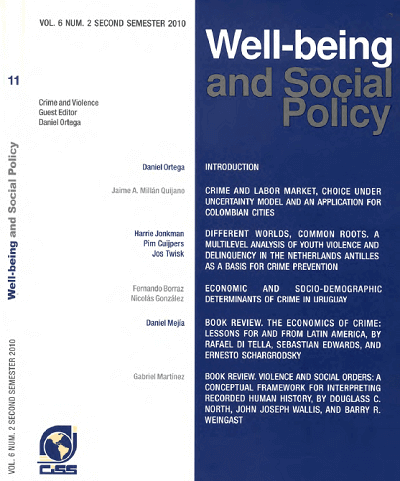
|
|
|
|

|
|
Book review. The economics of crime: lessons for and from Latina America, by Rafael Di Tella, Sebastian Edwards, and Ernesto Schargrodsky
The Economics of Crime: Lessons for and from Latin America makes an important contribution to the study of crime and violence in Latin America and to the debate about what works for reducing crime (and at what cost?). As the title of the book correctly suggests, the book brings together contributions from Latin American economists on the determinants and consequences of crime, as well as...
|
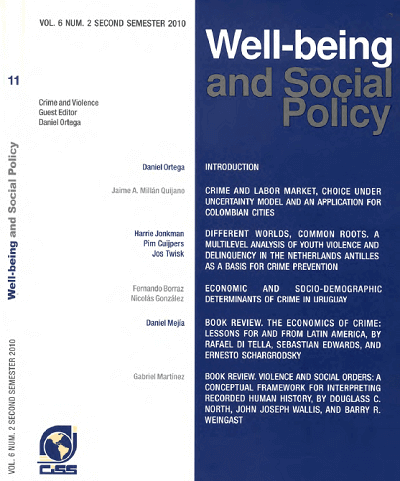
|
|
|
|

|
|
Economic and socio-demographic determinants of crime in Uruguay
This study estimates a panel data model to analyze the economic and socio-demographic determinants of crime in Uruguay across the 19 Uruguayan departments in the period 1986-2006.
This research has two components: i) to present a systematic analysis of the Uruguayan crime data and socio-economic and demographic characteristics of the population, and ii) to evaluate the empirical significance...
|
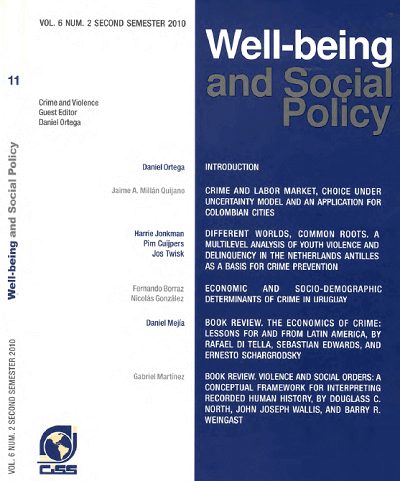
|
|
|
|

|
|
Different worlds, common roots a multilevel analysis of youth violence and delinquency in the netherlands antilles as a basis for crime prevention
Most research on the prevalence, determinants, and variations of violence and delinquency among youngsters is conducted in Western societies. This multilevel study is set in the Netherlands Antilles (NA) and aims to build up prognostic multilevel models as a basis for targeted crime prevention in a non-western area. Data were collected from a sample of adolescente in the NA. Non-hierarchical and...
|
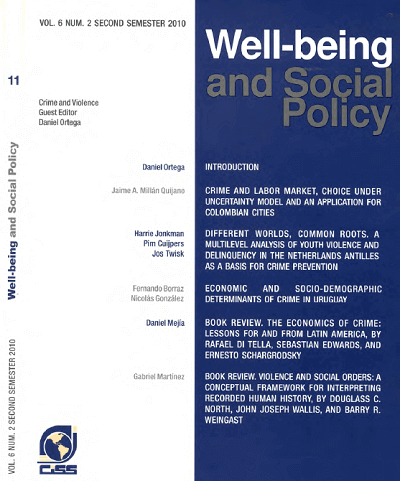
|
|
|
|

|
|
Introduction (On the studies presented at the International Conference on "Delinquency and Violence in Latin America and the Caribbean")
Crime has become the leading concern for citizens of the region and has been pushed to the forefront of the international policy agenda; what is more, the combination of very few success stories and abundant failures in curbing crime and violence has underscored how thin our understanding is and the difficulty of designing and implementing an effective strategy at the local level. This issue...
|
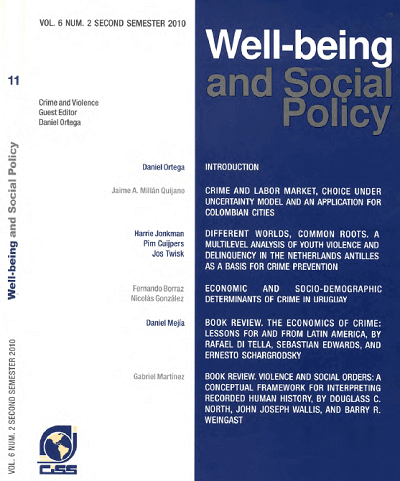
|
|
|
|

|
|
Public spaces in Mexico as social cohesion promoters: an structural modeling perspective
This research assessed the effects of several contextual factors (e.g, neighborhood insecurity, evaluation of public spaces, infrastructure, low risk behaviors) on social cohesion and residential satisfaction, in the context of low and medium-low socio economic status of individuals nearby renovated public spaces (parks and recreational facilities) in Mexico. The research method is based on...
|
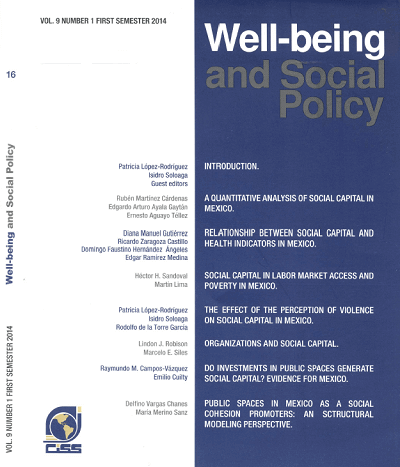
|
|
|
|

|
|
Unemployment insurance in Chile: a new model of income support for unemployed workers
This paper describes the Chilean experience concerning the implementation of a new unemployment insurance (UI) program. The use of individual savings accounts and private management are essential elements. In addition, a redistributive fund (Common Fund) helps workers pool risks, distributing resources from employed to unemployed workers and from stable firms to workers with low incomes and...
|
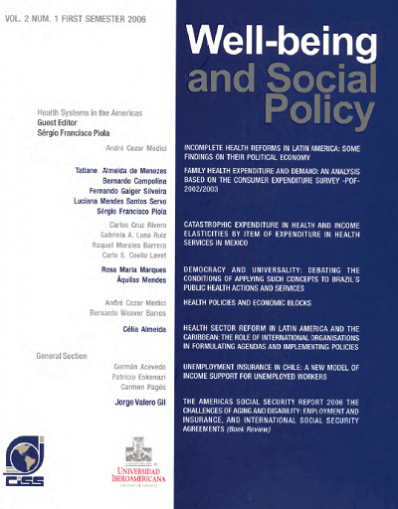
|
|
|
|

|
|
Financial development and the distribution of income in Latina America and the Caribbean
One of the central concerns in Latin America an the Caribbean (LAC) has been the reduction of poverty and inequality so prevalent in the continent. Using large world samples, the literature has found that financial development increases economic growth, increases the income of the poor, and reduces inequality. This paper studies the effects of financial development on the whole distribution of...
|
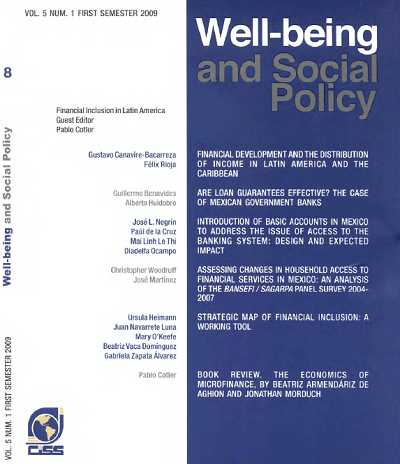
|
|
|
|

|
|
Family health expanditure and demand: an analysis based on the consumer expenditure survey - POF - 2002/2003
This paper aims at analyzing healthcare expenditure and demand of families, by estimating income-elasticity and price-elasticity for ten groups of products using the so-called model Linear Almost Ideal Demand System (LAIDS). The 2002/03 consumer expenditure surveys (POF) of the Fundação Instituto Brasileiro de Geografia e Estatística – FIBGE (Brazilian census bureau) are used, providing extremely...
|
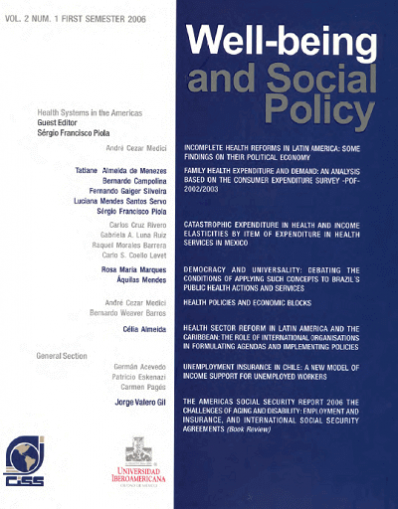
|
|
|
|

|
|
Introduction (about an international conference on "The effects of migration on sending countries")
The Inter-American Conference on Social Security (CISS) and Universidad Iberoamericana (UIA) co-hosted an international conference on “The Effects of Migration on Sending Countries” in February of 2006. The major objective of the conference was to examine a variety of channels through which migration affects the sending countries. Migrants change the dynamic of sending households; alter labor...
|
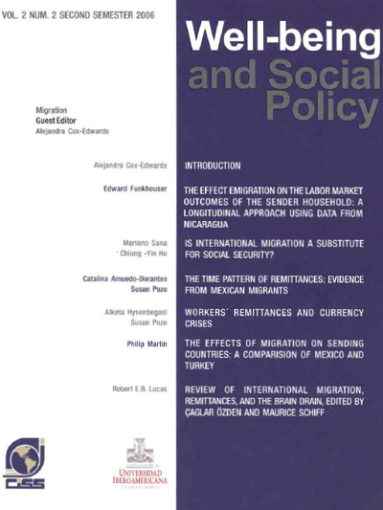
|
|
|
|

|
|
The Americas Social Security Report 2006 The challenges of aging and disability: employment and insurance, and international social security agreements (book review)
The 2006 Issue of the Report on Social Security in the Americas is divided in four chapters. The first two chapters address older-adult issues, the third chapter deals with disability-related problems, and the fourth chapter discusses Social Security agreements in the Americas. In the Presentation, it was pointed out that the objective of the Report on Social Security in the Americas is to become...
|
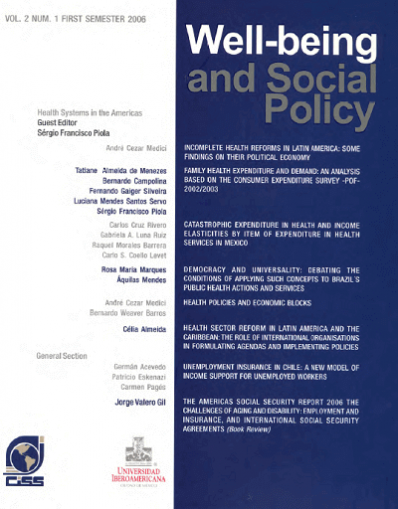
|
|
|
|

|
|
Health sector reform in Latin America and the Caribbean: the role of international organisations in formulating agendas and implementing policies
This article examines health sector reforms in Latin America and the Caribbean to discuss the ideological, theoretical, and conceptual elements that inform the reform agenda and the models put forward for attaining greater equity in the region’s countries. Its starting assumption is that the relevant literature generally neglects the economic, social, and political aspects underlying the...
|
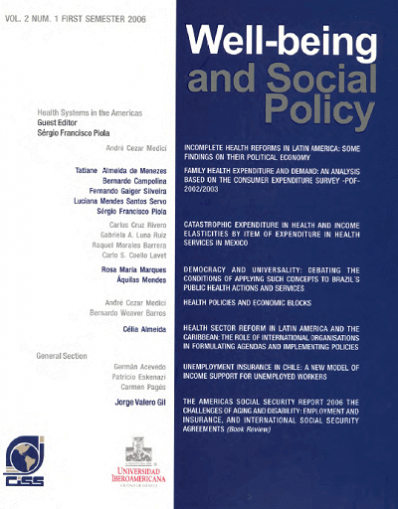
|
|
|
|

|
|
Health policies and economic blocks
This paper analyzes the roles of health goods and services markets within the regional integration process. It is a known fact that the consolidation of integrated markets is slower regarding social goods and services (as health and education) than among other goods and services (e.g. durable consumption goods). The paper discusses the nature of the health sector and its global dimension, showing...
|
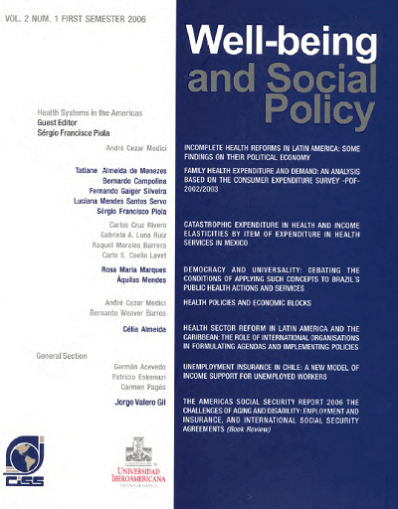
|
|
|
|

|
|
Democracy and universality: debating the conditions of applying such concepts to Brazil's public health actions and services
This paper reviews the determinants and conditionalities of the process of universalizing public health in developed countries, notably the European ones, and in Brazil, and is aimed at highlighting their differences. The first part discloses the main interpretations on the constructing of the Welfare State, emphasizing the characteristics of that historical moment and its articulation with...
|
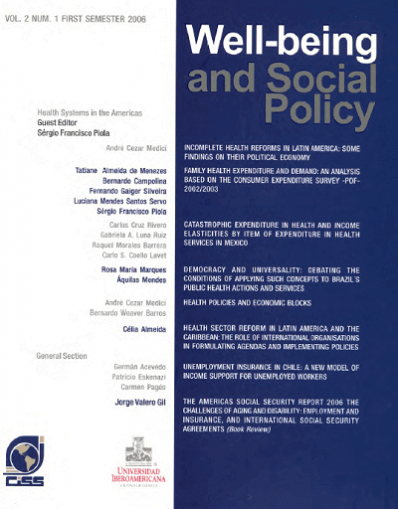
|
|
|
|

|
|
Catastrophic expenditure in health and income elasticities by item of expenditure in health services in Mexico
The objective of this article is to put in economic perspective the expenditure in health within the pattern of family expenditure of the Mexican households. Information of the National Survey on Income Expenditure of Households (ENIGH) of Mexico of 2004 is analyzed on: structure of the expenditure of the households, expenditure in health and income-expenditure elasticities in health; by...
|
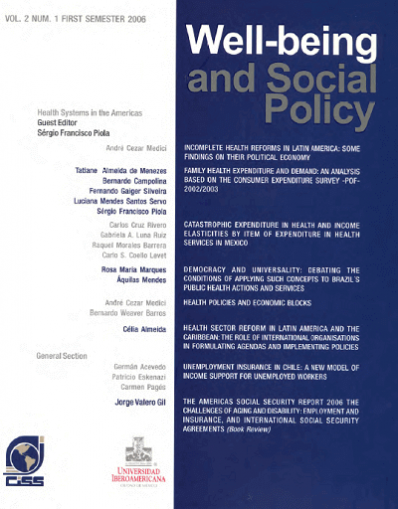
|
|
|
|

|
|
Incomplete health reforms in Latin America: some findings on their political economy
This paper raises the point that only few health reforms implemented in Latin American countries modified the existing health systems in order to fix the problems brought by the institutional fragmentation typical of this sector. A great part of these reforms did not implemented the necessary measures to improve coordination among health systems in the prevailing pluralistic model and besides,...
|
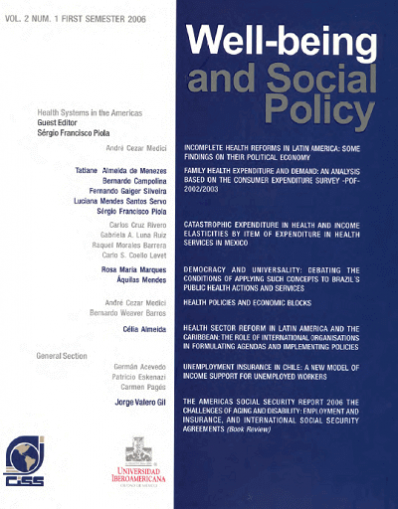
|
|
|
|

|
|
Is international migration a substitute for social security
The focus on short-term macroeconomic factors, including unemployment and wages, is insufficient to explain international migration. Institutional factors, bound to change only in the long run, can potentially have a large impact on migration flows. To illustrate this, we analyze Mexico-U.S. migration focusing on social security coverage, an important indicator of job formality. Using...
|
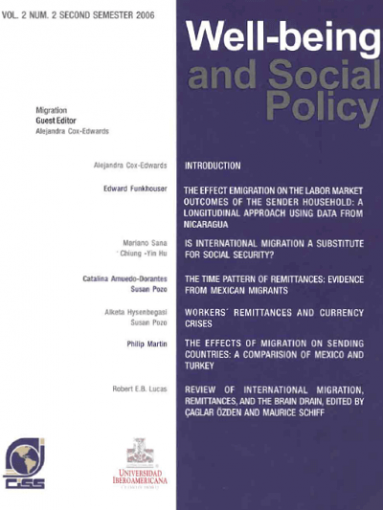
|
|
|
|

|
|
The Americas Social Security Report 2005: labor markets and the fragmentation of social insurance, financing for HIV-AIDS by social security (Book review)
The Americas Social Security Report 2005, published by the CISS, gathers the contributions, opinions, and comments of more than 30 social security specialists from different countries in the American continent, as well as the review of the most recent literature on this matter. The purpose is to present, to specialized public and to laymen, a detailed, analytic, and updated report of the...
|
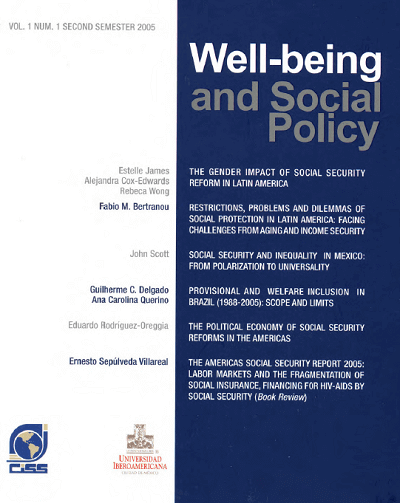
|
|
|
|

|
|
The political economy of social security reforms in the Americas
This paper analyses the factors affecting the decision to apply a reform (parametric and structural) in the Americas, which may hold a specific set of conditions, i.e. a sui generis political system and a high degree of economic openness, among others. Economic freedom is relevant in the case of structural reforms, while results for the share of older population are not conclusive. It may be that...
|
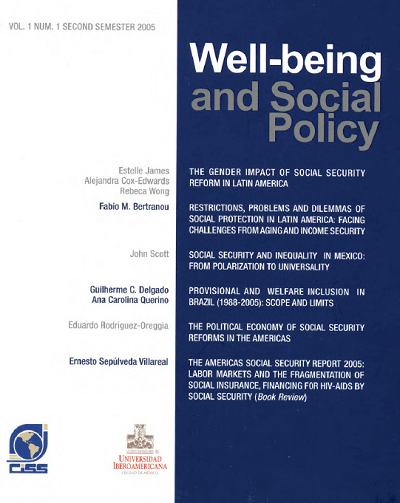
|
|
|
|

|
|
Provisional and welfare inclusion in Brazil (1988-2005): scope and limits
This paper analyses the influence of new rights derived from the Social Security System in Brazil after the Federal Constitution (1988). At least, three different and independent forces determinate the arrangements in social security policies: 1) the new social rights created by constitutional rules in response to social pressure; 2) the decrease of employment and wages in salaried jobs imposed...
|
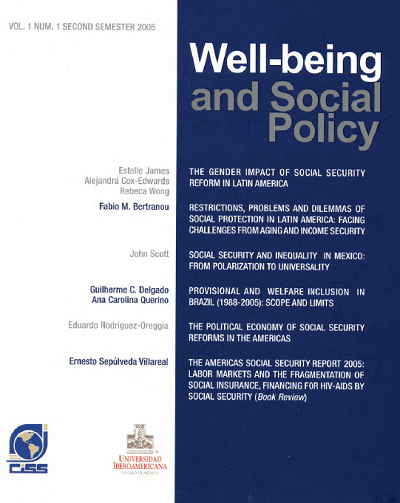
|
|
|
|
|